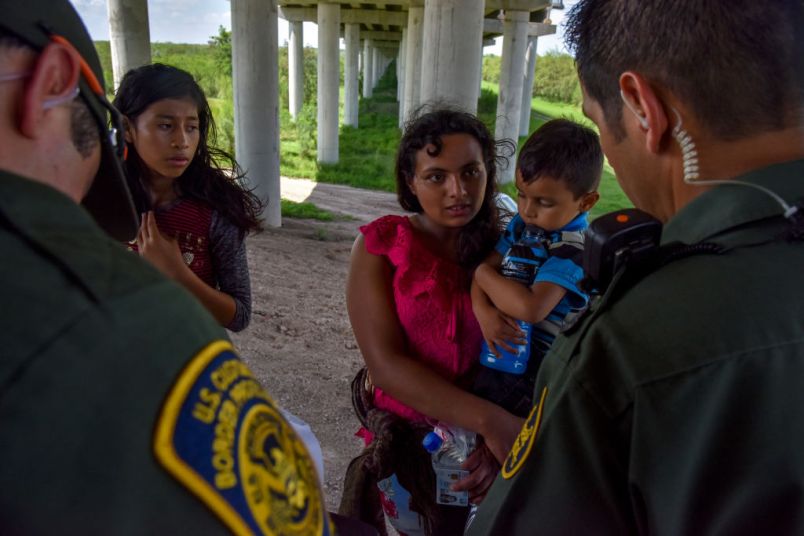The Trump administration claimed victory on Thursday after reuniting only 57 out of the 103 children under 5 years old who were separated from their parents at the border as a result of Trump administration policy.
The families are covered by an ACLU lawsuit, Ms. L vs. ICE, in which U.S. District Judge Dana Sabraw ordered the government to reunite families that had been separated by Trump administration policy. Children under age 5 were ordered to be reunited with their parents by Tuesday; older children were ordered to be reunited by July 26. An adult had elected late to be added to the suit, raising the number of young children separated from their parents to 103 from 102, the Trump administration said.
“TRUMP ADMINISTRATION COMPLETES REUNIFICATION FOR ELIGIBLE CHILDREN UNDER 5,” read the headline of a joint Justice Department, Department of Homeland Security and Department of Health and Human Services statement Thursday morning.
On a phone call with reporters Thursday morning, Chris Meekins, chief of staff of HHS’s Office of the Assistant Secretary for Preparedness and Response, was blunt about what would happen to the children whose parents were deemed “ineligible” for reunification.
“For any kid that has a adult that’s been deemed ineligible, we continue to go through the normal sponsorship process,” Meekins said, meaning that children could be taken out of foster care by other family members in the United States, if those adults are deemed suitable sponsors. “We go through the normal process we go through for the 12,000 kids that we currently have in our care.”
Later in the statement, the administration explained away the parents who remained separated from their 46 children: 12 have already been deported “and are being contacted.” (The Trump administration had previously argued they shouldn’t be required to reunite children with deported parents. Sabraw disagreed.)
“If those parents want their children to go return with them — which, again, they had that opportunity once — we are working with the consular officials in the foreign governments to provide information that would help facilitate that, but we don’t have the legal authority to bring those individuals back into the country for reunification purposes,” Matthew Albence, executive associate director of ICE’s Enforcement and Removal Operations division, said on the call.
Eleven adults were either in the custody of the U.S. Marshals “for other offenses” (9) or in the the custody of state jails (2). Eleven adults had what the Trump administration called a “serious criminal history.” Seven adults were “determined not to be the parent.” And one adult each had a “falsified birth certificate,” was “alleged to have abused the child” and was “being treated for a communicable disease.”
One adult’s location “has been unknown for over a year,” the Trump administration said. (They may be an American citizen.) And one adult was ineligible for reunification because another adult in the same household had been found to have previously been charged with sexually abusing a child, when the government ran newly required background checks on everyone in the household.
Sabraw on Tuesday told the government to stop fingerprinting and vetting every adult sharing a household with parents who’d been separated from their children, a new procedure that immigration advocates argue creates a disincentive for reunification — undocumented people are understandably wary of handing their fingerprints over to DHS, which houses Immigration and Customs Enforcement.
“The parents are not applying for custody,” Sabraw said. “They don’t have to prove they will be a good sponsor. The government has to prove they are unfit or a danger.”
On the call Thursday, the government refused to detail the specific reasons that all 11 adults with a “serious criminal history” had been deemed ineligible for being reunited with their children. In its press release, and earlier on the call, the Trump administration had listed only a handful of examples.
“Are they all convictions?” a Washington Post reporter asked. “What kind of charges are we talking about? Can they at some point get their children back?”
Albence did as he’d done before, listing just a few examples to represent the 11 adults with “serious criminal” histories.
“We have an adult who was charged with smuggling,” he said, “an adult convicted of child cruelty and narcotics, an adult with domestic violence charges, an adult wanted for murder in their home country. There are others that we can go through as well, but these are pretty serious things—”
The reporter interjected: Would the government list all of the reasons the 11 adults were deemed ineligible?
“I just went through those examples,” Albence said, sounding annoyed. “I’m not going to go through every one of the 11, but those are representative of each and every case that we have.”
This post has been updated.







Well, sure.
Like they claim only 64 Puerto Ricans died in Hurricane Maria when the actual toll is over 5000. Let’s face it. Brown lives don’t matter to Trump. There’s no other logical conclusion as he’s been very consistent on this point.
I hope he doesn’t throw paper towels at the poor kids.
Jeez. Only half of the toddlers and babies still in a legal limbo hell. You’re a real hero, President pied piper.
So domestic abuse is no longer a valid reason for asylum, but alleged abuse is a valid reason to take a foreign born child from his parents and keep him in the US under different parantage? Makes sense…
Just wait…it’s coming…“46 out of 103 is 45%!!! This shows 45% of people bringing kids over the border are such horrible people…abusers, traffickers, murderers, rapists, criminals…that they shouldn’t have children and are just a problem waiting to happen if we let them in the country.”
Some days I wished I believed in Hell.
Today, His Satanic Majesty has added a new name to his Abandon All Hope wall:
Secretary for Preparedness and Response